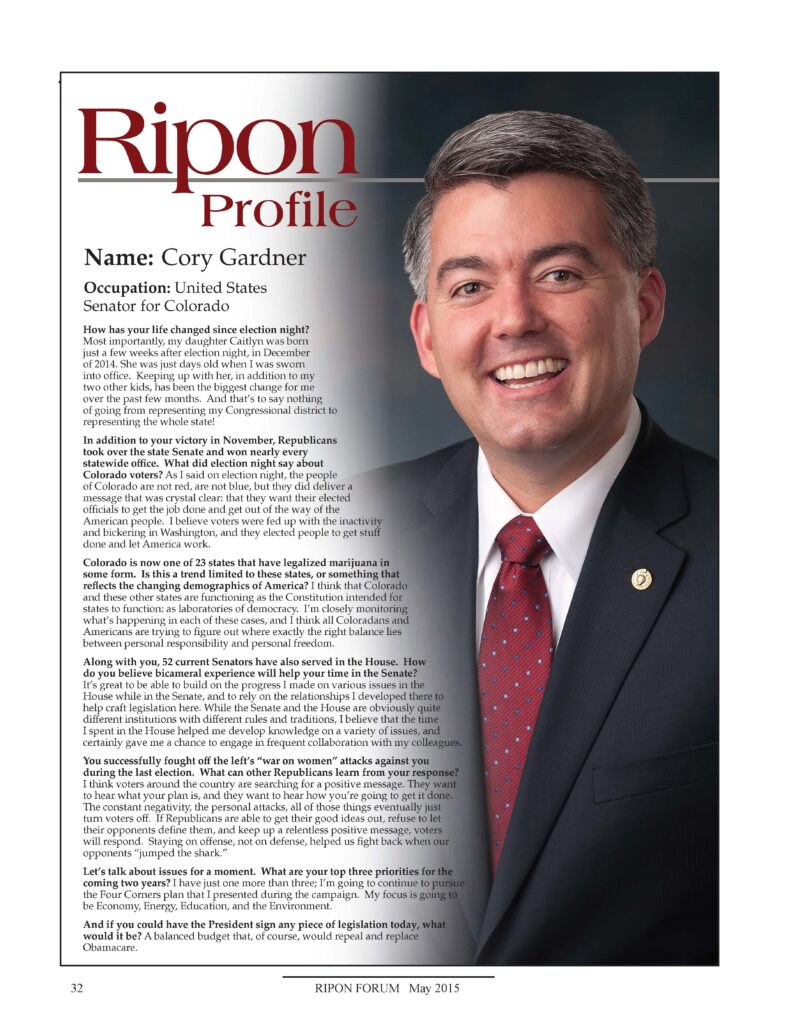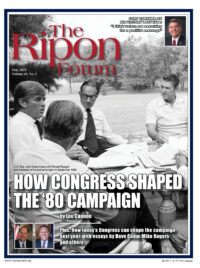
Name: Cory Gardner
Occupation: United States Senator from Colorado
How has your life changed since election night? Most importantly, my daughter Caitlyn was born just a few weeks after election night, in December of 2014. She was just days old when I was sworn into office. Keeping up with her, in addition to my two other kids, has been the biggest change for me over the past few months. And that’s to say nothing of going from representing my Congressional district to representing the whole state!
In addition to your victory in November, Republicans took over the state Senate and won nearly every statewide office. What did election night say about Colorado voters? As I said on election night, the people of Colorado are not red, are not blue, but they did deliver a message that was crystal clear: that they want their elected officials to get the job done and get out of the way of the American people. I believe voters were fed up with the inactivity and bickering in Washington, and they elected people to get stuff done and let America work.
Colorado is now one of 23 states that have legalized marijuana in some form. Is this a trend limited to these states, or something that reflects the changing demographics of America? I think that Colorado and these other states are functioning as the Constitution intended for states to function: as laboratories of democracy. I’m closely monitoring what’s happening in each of these cases, and I think all Coloradans and Americans are trying to figure out where exactly the right balance lies between personal responsibility and personal freedom.
Along with you, 52 current Senators have also served in the House. How do you believe bicameral experience will help your time in the Senate? It’s great to be able to build on the progress I made on various issues in the House while in the Senate, and to rely on the relationships I developed there to help craft legislation here. While the Senate and the House are obviously quite different institutions with different rules and traditions, I believe that the time I spent in the House helped me develop knowledge on a variety of issues, and certainly gave me a chance to engage in frequent collaboration with my colleagues.
You successfully fought off the left’s “war on women” attacks against you during the last election. What can other Republicans learn from your response? I think voters around the country are searching for a positive message. They want to hear what your plan is, and they want to hear how you’re going to get it done. The constant negativity, the personal attacks, all of those things eventually just turn voters off. If Republicans are able to get their good ideas out, refuse to let their opponents define them, and keep up a relentless positive message, voters will respond. Staying on offense, not on defense, helped us fight back when our opponents “jumped the shark.”
Let’s talk about issues for a moment. What are your top three priorities for the coming two years? I have just one more than three; I’m going to continue to pursue the Four Corners plan that I presented during the campaign. My focus is going to be Economy, Energy, Education, and the Environment.
And if you could have the President sign any piece of legislation today, what would it be? A balanced budget that, of course, would repeal and replace Obamacare.




